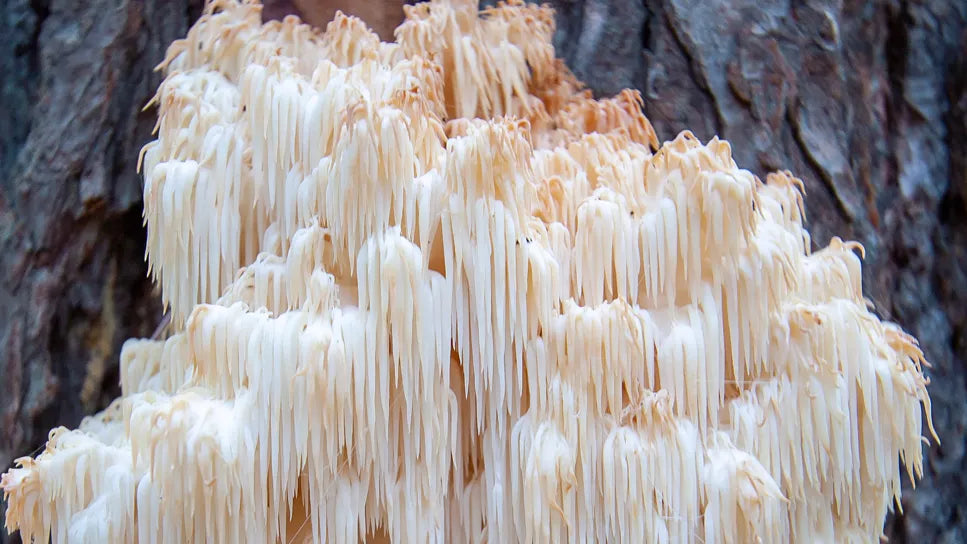
Monkey Head: Truths and Myths About This Mushroom and the Best Natural Alternatives
Share
In recent years, the Monkey Head mushroom has gained considerable popularity due to its supposed health benefits , especially in powder form.

Touted as a miracle supplement that can improve brain function, boost the immune system, and even fight degenerative diseases, this mushroom has found pride of place on health food store shelves.
However, it is essential to examine the available scientific evidence to understand whether it is really worth including Monkey Head in your diet or if there are more effective natural alternatives.
What is the Monkey Head?
The Monkey's Head , also known as Hericium erinaceus , is an edible mushroom that grows on fallen trees in Europe, Asia and North America.
This mushroom is easily recognizable by its unique appearance, similar to a lion's mane , from which another of its names derives (in English it is in fact called Lion's Mane).

It is often consumed in powder form , capsules , or even as an ingredient in culinary dishes.
Traditionally, it has been used in Chinese medicine to treat various ailments, due to its perceived medicinal properties.
The Alleged Properties of the Monkey Head
The main properties attributed to Monkey Head include improved memory and concentration , immune system support and anti-inflammatory effects.
Many people take it in the hope of gaining mental and cognitive health benefits.

Some proponents claim that the mushroom can aid in the regeneration of nerve cells , improve mood, reduce anxiety, and fight insomnia.
But what does science say?
The Science Behind The Monkey Head
Despite its growing popularity , scientific evidence supporting the properties of Monkey Head is limited and not always conclusive .
Some preliminary studies have suggested that the mushroom may have neuroprotective effects, but most of this research has been conducted in animals or in vitro, not in humans .
Preliminary Studies and Initial Research
An example of an often-cited study is one published in the "Journal of Agricultural and Food Chemistry" in 2011, which suggested that Monkey Head could promote the growth of nerve cells in mice .

However, translating these findings to humans is complex and requires further large-scale clinical studies.
Other in vitro studies have indicated that the mushroom's active compounds, such as erinacines and hericenones , can stimulate the synthesis of Nerve Growth Factor ( NGF ), a protein crucial for the growth , maintenance and survival of neurons .
Studies on Human Beings
When it comes to human studies, the evidence is even more sparse .
A small study conducted on a group of elderly Japanese people suggested that taking Monkey Head may improve cognitive function in subjects with mild cognitive impairment.
However, this study was limited in its sample size and duration, and further studies are needed to confirm these findings.

A systematic review published in "Frontiers in Aging Neuroscience" highlighted that, although there are promising results, the evidence is still insufficient to draw definitive conclusions on the effectiveness of Monkey Head in humans.
Variability in dosages , formulations , and methods of administration makes it difficult to compare results from existing studies.
Lack of Convincing Evidence
Medical science relies on rigorous, replicable clinical studies to confirm the effectiveness of any treatment or supplement.
In the case of Monkey Head, the current evidence is not strong enough to support claims of its beneficial properties with certainty.
Many available studies are preliminary or conducted in animal models, which limits the ability to generalize the findings to humans.

Additionally, the lack of standardization in Monkey Head products makes it difficult to determine what the effective dose is and which form of the mushroom is most bioactive.
This creates a situation where consumers may not get the desired benefits even if the mushroom did possess beneficial properties.
More Effective Natural Alternatives
Since scientific evidence on Monkey Head is still limited, it is worth exploring other natural options with more solidly documented benefits .
1. Bacopa Monnieri
Bacopa Monnieri is an Ayurvedic herb traditionally used to improve memory and concentration .

Numerous clinical studies have confirmed its positive effects on cognitive functions , making it a valid and well-documented alternative.
Bacopa works by modulating neurotransmitters and improving synaptic transmission, promoting neuronal plasticity .
2. Citicoline
Citicoline is a nootropic compound known for its beneficial effects on memory and cognitive function.

Numerous clinical studies confirming its positive effects on cognitive abilities , making it a valid choice for those seeking to improve their mental performance.
Citicoline works by increasing the levels of phosphatidylcholine and acetylcholine in the brain, improving communication between neurons and supporting the health of nerve cells , thus promoting a sharper and more responsive mind.
3. Rhodiola Rosea
Rhodiola Rosea is an adaptogenic herb that has been shown to reduce fatigue and improve mental endurance .

Again, clinical studies have shown that Rhodiola can improve cognitive performance and reduce symptoms of anxiety and depression .
This plant has been used for centuries in traditional European and Asian medicine to increase physical and mental endurance .
4. Ashwagandha
Ashwagandha is another adaptogen with a long history of use in Ayurvedic medicine.

It is known for its anti-stress properties and support for cognitive function.
Clinical studies have shown that ashwagandha can improve memory , reduce anxiety , and improve sleep quality.
Monkey Head vs. Alternatives
To better understand the differences between Monkey Head and its natural alternatives, it is helpful to examine some key aspects such as the amount of research available, the quality of the evidence, and the mechanisms of action.
Search Available
While research on Monkey Head is still in its infancy, many of the natural alternatives like Bacopa Monnieri and Rhodiola Rosea have decades of clinical studies supporting their effectiveness.
This is not to say that Monkey Head cannot be effective, but at present, the evidence supporting its properties is less than convincing.
Quality of Evidence
The quality of evidence is critical .
Bacopa studies, for example, include large-scale randomized, controlled clinical trials , which are the gold standard of medical research.

Conversely, many studies on the Monkey Head are preliminary and limited in their methodology.
Mechanisms of Action
Understanding how these supplements work is equally important.
Bacopa Monnieri modulates neurotransmitters and promotes neuronal plasticity .

These mechanisms are well documented and explain how these supplements can have beneficial effects on brain health.
Choosing the Right Supplement
When it comes to choosing a supplement , it is essential to consider your individual needs and the available scientific evidence .
While Monkey Head may seem like an attractive solution to improving mental and physical health, current scientific evidence is insufficient to support these claims with certainty.
Conversely, natural ingredients like Rhodiola Rosea, Ashwagandha, and Bacopa Monnieri offer well-documented benefits and are safer, more effective alternatives.
Final Considerations
In conclusion, while Monkey Head continues to be the subject of research and interest , those seeking proven improvements in mental and physical health may benefit more from other, more studied natural ingredients .
Curiosity about new solutions is always positive, but it is essential to rely on what science can actually guarantee.
When it comes to health , it is essential to rely on solid scientific evidence and choose supplements and foods that have demonstrated effectiveness through rigorous clinical studies.
Despite the potential of the Monkey Head, at the moment it is more prudent to opt for alternatives with a more robust scientific basis.
Frequently Asked Questions (FAQs)
1. What is the Monkey Head?
The Monkey's Head, also known as Hericium erinaceus , is an edible mushroom with a characteristic appearance similar to a lion's mane.
It is native to Europe, Asia and North America and is traditionally used in Chinese medicine .
2. What are the alleged properties of the Monkey Head?
The main properties attributed to Monkey Head include improved memory and concentration , immune system support and anti-inflammatory effects.
However, scientific evidence supporting these properties is still limited.
3. What does science say about the Monkey Head?
Preliminary studies suggest that Monkey Head may have neuroprotective effects, but most of this research has been conducted in animals or in vitro.
Clinical evidence in humans is scarce and inconclusive .
4. Are there any natural alternatives to Monkey Head?
Yes, there are several natural alternatives with well-documented benefits. Among these, Citicoline , Bacopa Monnieri , Rhodiola Rosea , and Ashwagandha are among the most studied and proven .
5. Why might natural alternatives be better?
Natural alternatives like Citicoline and Bacopa have decades of clinical studies supporting their effectiveness .
These ingredients are supported by more established research and offer well-documented benefits for mental and physical health.
6. Can I take Monkey Head in combination with other herbs?
Before combining Monkey Head with other herbs or supplements, it is advisable to consult a doctor or health professional .
Each individual has specific needs and conditions that must be considered.
7. What is the recommended dose of Monkey Head?
There is no standardized dose for Monkey Head due to variability in available products.
It is important to follow the manufacturer's directions and consult a health care professional to determine the appropriate dose.
8. Are there any side effects associated with Monkey Head?
So far, Monkey Head is considered safe for most people when taken in appropriate doses .
However, some people may experience side effects such as gastrointestinal upset .
It is always advisable to start with a low dose and gradually increase it under the supervision of a doctor.
9. Is Monkey Head suitable for children?
The use of Monkey Head in children has not been sufficiently studied.
Therefore, it is best to avoid giving it to children without the advice of a doctor.

